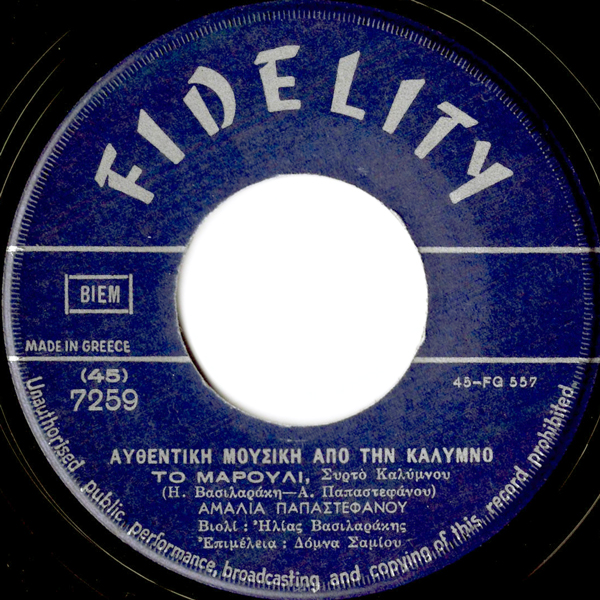00:00
Home / Her Work / Song Catalogue / Exile Is the Greatest Hardship
Το Μαρούλι

Exile is the greatest hardship, the parting so upsetting,
but oh, that greeting “Welcome home”, oh that, Marouli,1 is bliss.
The diver’s air-pump is my mother, the winding winch my sister,
and on my mate upon the deck2 my very life depends.
For you, I wear the diving-suit, and drag the tube3 along;
for you, they helped my feet into the boots with the iron soles.4
Translated by John Leatham
1Marouli: affectionate form of Maria
2The experienced sailor who stayed behind, on the boat, holding the guide rope (kolaouzo) which, tied to the diver, was used by him to communicate with the surface
3The tube which connected the diver’s helmet to the air pump on the spongers boat, allowing the diver to breath
4Heavy, metal boots which, along with the other weights, helped the diver walk on the seabed
Έρι, ο μισεμός είναι καημός, το κατευόδιο ζάλη,
έρι, και το καλωσορίσατε, αχ Μαρούλι,1 είναι χαρά μεγάλη.
Η μηχανή ’ναι η μάνα μου, η ρόδα η αδερφή μου,
και στον κολαουζέρη2 μου κρέμεται η ζωή μου.
Για σένα βάζω φόρεμα,3 για σε τραβώ μαρκούτσα,4
για σένα μου φορέσανε τα σιδερέ5 παπούτσια.
1Μαρούλι: υποκοριστικό του Μαρία
2κολαουζέρης: ο έμπειρος ναύτης που μένει πάνω στο καΐκι, κρατώντας συνεχώς τον οδηγό-σκοινί (κολαούζο), με το οποίο είναι δεμένος ο δύτης και μέσω του οποίου εκείνος επικοινωνεί και του στέλνει τα μηνύματά του
3φόρεμα: το σκάφανδρο, η στολή του δύτη
4μαρκούτσα: αεραγωγός σωλήνας που ενώνει την περικεφαλαία του σκάφανδρου με την αεραντλία τον σπογγαλιευτικού πλοίου και μέσω του οποίου ο δύτης αναπνέει
5σιδερέ: βαριά μεταλλικά παπούτσια, που μαζί με άλλα βαρίδια βοηθούσαν τον δύτη να περπατάει στον πάτο της θάλασσας
The song recounts the seasonal departure of sponge fishermen from their home island as they sailed to distant sponge-fishing grounds. Because of the hazardous nature of their work —which required them to dive to great depths with only primitive gear—, their send-off often took on the character of a dirge, marking a journey from which they might never return.
Miranda Terzopoulou (2018)
Studio recording (1963). Released on a 45 rpm disc (Fidelity 7259, 1963), supervised by Domna Samiou (Recordings on 45 RPM). In 2008, Yiorgos Tsambras included the track in the CD collection Mousiko Odiporiko 1959-1969 (Universal Music, 2008).

Singers

Violin